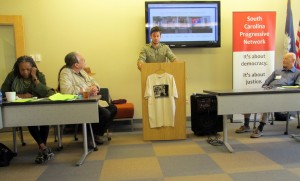Presentation to the SC Progressive Network at its annual fall retreat Nov. 15 in Columbia.
Daniel Deweese, New Legacy Project
A Faceless Master.
A specter is haunting South Carolina — take it from someone who has been to ten of its cities in ten days — the specter of Modjeska Simkins, the ghosts of a progressive and effective left.
Nearly a century ago, on the precipice of the emergence of the twin monsters of the 20th century, namely Stalinism and Fascism, Freud, in his prescient insight identified the forthcoming antagonism; “Men have brought their powers of subduing the forces of nature to such a pitch that by using them they could now very easily exterminate one another to the last man. They know this—hence arises a great part of their current unrest, their dejection, their mood of apprehension. And now it may be expected that the other of the two heavenly forces, eternal Eros, will put forth his strength so as to maintain himself alongside of his equally immortal adversary.” (1920, p.147)
We are on the verge of a new totalitarianism, one with a faceless master; that of global capital. This is attested to by the winner of our last election; money. Millions of so called “dark dollars”-uncountable, utterly inundated this election. It is appropriate here to recall Boiseguillebert’s insight of finance as the alembic of commodities that extracts that unholy essence and “…money declares war on the whole of humanity.” ( Marx, 1992, p.239).
A Princeton study has indicated something we Leftists have known for a long time, namely, that the United States is transforming into an oligarchy. It is economic elites who possess the most influence over public policy (TPM, 2014).
The first step in any critique of ideology that has the potential to foster revolutionary upheaval is to identify the position of the master (the ruling class) as being what it is, namely, an empty position. There exists an irreducible gap between the totalitarian master and his title. The master seizes this mantle and yet it is not congruent to his being. The title is something that is assumed rather than a “quality” that is inherent to the master.
For example, the divinity of kings or the so called “hard work” of Wall Street executives are just some of the reasons manifested to justify the position of mastery which in turn is utilized to justify the accumulation of the surplus social product at the expense of the working class. The revolutionary must not only expose the master as being empty but she must also expose and attack that in herself which chains her to the ruling ideology. Here we return to the predicament of postmodernity, namely, that of unlimited consumption. If the consumption of frivolous commodities is the equivalent to or at least the path to social fulfillment, then why is postmodernity so fraught with discontent? This is true in even the wealthiest of the industrialized nations (I developed this idea further in my article Truth as Contradiction).
The duty to consume and its failure to cultivate a meaningful social bond should be taken as a sign of the impotence of the dominant discourse. The gaps in this discourse also manifest themselves in the forms of poverty, war, starvation and so on. For instance; “The world produces enough food to feed everyone. World agriculture produces 17 percent more calories per person today than it did 30 years ago, despite a 70 percent population increase.” (worldhunger.org). And yet millions starve. It is true that 300,000 South Carolinians would have had health insurance if the Governor would have accepted the Medicaid expansion. And yet thousands will go with out, some even to their deaths.
The Ghosts that Speak Truth
The revolutionary must pronounce to the ruling class and all those who rest underneath their heel; “ I am your truth! (poverty, oppression, exploitation!), you the master are not complete!” It is crucial for a dialectical analysis to realize that this undeniable excess, these foreclosed subjects, are not separate from the dominant discourse but are apart of the the effects of the totality of global capital. After traveling through our fair state it became clear to me; there are those of us willing to protest, that is, publicly enunciate this truth of the foreclosed excess. However, these scattered voices wander like ghosts searching for an apparatus that would materialize their very substance into something more.
In Lenin’s What Is to Be Done? he emphasizes that the working-class will not spontaneously formulate into an emancipatory collective due to oppressive conditions. He believed it would take a vanguard party to educate and organize the people. This I claim was the victory won in the Healthy Democracy Road Show, namely, laying the ground work for this emancipatory collective in South Carolina, the ground work for a new legacy. Therefore, something of an education is required. Namely, a school that is right, the Modjeska School of Human Rights!
The way for the Left to undermine the dominant discourse is to facilitate the birth of a new discourse by utilizing the emancipatory legacy left for us by the revolutionaries of the past. To conclude, we return to the spectral realm and echo a thought from Walter Benjamin; ?“ Every Revolution is not only directed towards the future but it redeems also the past failed Revolutions, all the ghosts-as if the living dead of the past Revolutions, which are roaming around unsatisfied will finally find their home in the new freedom.” (Zizek, 2014).
***************
Freud, S. (1920). Civilization and its discontents. (p. 135). New York/London: W.W. Norton & Company.
Lenin, V. I. (1969) What is to be done?: burning questions of our movement. Intl Publishing
Marx, K. (1992) Capital Volume 1 (p.239). London: Penguin Classics.
www.worldhunger.org
Zizek, S. (2014) The pervert’s guide to ideology

